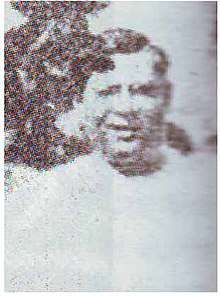R. C. Majumdar
| R. C. Majumdar | |
|---|---|
 | |
| Vice-Chancellor of University of Dhaka | |
|
In office 1 January 1937 – 30 June 1942 | |
| Preceded by | A. F. Rahman |
| Succeeded by | Mahmud Hasan |
| Personal details | |
| Born |
4 December 1884 Khandapara, Faridpur, Bengal Presidency, British India |
| Died |
11 February 1980 (aged 95) Kolkata, West Bengal, India |
| Nationality | Indian |
| Alma mater | University of Calcutta |
Ramesh Chandra Majumdar (known as R. C. Majumdar; 4 December 1884 – 11 February 1980)[1] was a historian and professor of Indian history.[2][3]
Early life and education
Coming from a Baidya family, Majumdar was born in Khandarpara, Faridpur, Bengal Presidency, British India (now in Bangladesh) on 4 December 1884, to Haladhara Majumdar and Bidhumukhi.[1] In 1905, he passed his Entrance Examination from Ravenshaw College, Cuttack.[1] In 1907, he passed F.A. with first class scholarship from Surendranath College and joined Presidency College, Calcutta.[1] Graduating in B.A.(Honours) and M.A. from Calcutta University in 1909 and 1911 respectively, he won the Premchand Roychand scholarship from the University of Calcutta for his research work in 1913.[1]
Career
Majumdar started his teaching career as a lecturer at Dacca Government Training College. Since 1914, he spent seven years as a professor of history at the University of Calcutta. He got his doctorate for his thesis "Corporate Life in Ancient India".[4] In 1921 he became professor of history in newly established University of Dacca. He also served, until he became its vice chancellor, as the head of the Department of History as well as the dean of the Faculty of Arts. Between 1924 and 1936 he was Provost of Jagannath Hall. Then he became the vice chancellor of that University, for five years from 1937 to 1942. From 1950, he was Principal of the College of Indology, Benares Hindu University. He was elected the general president of the Indian History Congress and also became the vice president of the International Commission set up by the UNESCO for the history of mankind.
Works
Majumdar started his research on ancient India. After extensive travels to Southeast Asia and research, he wrote detailed histories of Champa (1927), Suvarnadvipa (1929) and Kambuja Desa. On the initiative of Bharatiya Vidya Bhavan, he took up the mantle of editing a multi-volume tome on Indian history. Starting in 1951, he toiled for twenty six long years to describe the history of the Indian people from the Vedic Period to the present day in eleven volumes. In 1955, Majumdar establishes the College of Indology of Nagpur University and joined as principal. In 1958-59, he taught Indian history in the University of Chicago and University of Pennsylvania. He was also the president of the Asiatic Society (1966–68) and the Bangiya Sahitya Parishad (1968–69), also the Sheriff of Calcutta (1967–68).
When the final volume of "The History and Culture of the Indian People" was published in 1977, he had turned eighty-eight. He also edited the three-volume history of Bengal published by Dacca University. His last book was "Jivaner Smritidvipe".
Views on the Indian independence movement
When the Government of India set up an editorial Committee to author a history of the freedom struggle of India, he was its principal member. But, following a conflict with the then Education Minister Maulana Abul Kalam Azad on the Sepoy Mutiny, he left the government job and published his own book. The Sepoy Mutiny & Revolt of 1857. According to him the origins of India's freedom struggle lie in the English-educated Indian middle-class and the freedom struggle started with the Banga Bhanga movement in 1905. His views on the freedom struggle are found in his book History of the Freedom Movement in India. He was an admirer of Swami Vivekananda and Ramakrishna Paramahamsa.
Bibliography
- The Early History of Bengal, Dacca, 1924.
- Champa, Ancient Indian Colonies in the Far East, Vol.I, Lahore, 1927. ISBN 0-8364-2802-1
- Suvarnadvipa, Ancient Indian Colonies in the Far East, Vol.II, Calcutta,
- The History of Bengal, 1943. ISBN 81-7646-237-3 (digitized by the Digital Library of India)
- Kambuja Desa Or An Ancient Hindu Colony In Cambodia, Madras, 1944
- An Advanced History of India. London, 1960. ISBN 0-333-90298-X
- The History and Culture of the Indian People, Bombay, 1951–1977 (in eleven volumes).
- Ancient India, 1977. ISBN 81-208-0436-8
- History of the Freedom movement in India (in three volumes), Calcutta, ISBN 81-7102-099-2.
- Vakataka – Gupta Age Circa 200–550 A.D. ISBN 81-208-0026-5
- Main currents of Indian history ISBN 81-207-1654-X
- Classical accounts of India
- Hindu Colonies in the Far East, Calcutta, 1944, ISBN 99910-0-001-1
- India and South-East Asia, I.S.P.Q.S. History and Archaeology Series Vol. 6, 1979, ISBN 81-7018-046-5.
- The History of Ancient Lakshadweep, Calcutta, 1979
- Corporate Life in Ancient India, Calcutta.
References
- 1 2 3 4 5 Sarkar, H. B. (29 March 1980). "RAMESH CHANDRA MAJUMDAR". Annals of the Bhandarkar Oriental Research Institute. 61 (1/4): 361–365. JSTOR 41691933.
- ↑ Shobhan Saxena (17 October 2010). "Why is our past an area of darkness?". Times Of India. Retrieved 15 December 2012.
- ↑ "Books". Spectrum. The Sunday Tribune. 3 September 2006. Retrieved 15 December 2012.
- ↑ Corporate Life in Ancient India: Thesis. mcmaster.ca. Retrieved 17 November 2013
External links
| Wikiquote has quotations related to: R. C. Majumdar |